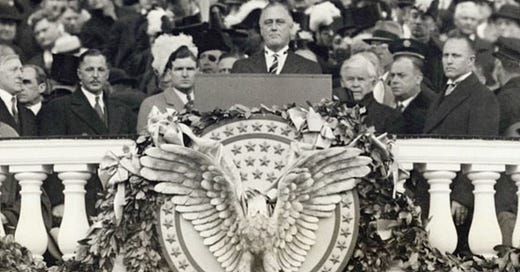Franklin Delano Roosevelt: “Where There Is No Vision The People Perish”: ‘President Hoover, Mr. Chief Justice, my friends:
This is a day of national consecration, and I am certain that my fellow-Americans expect that on my induction into the Presidency I will address them with a candor and a decision which the present situation of our nation impels.
This is pre-eminently the time to speak the truth, the whole truth, frankly and boldly. Nor need we shrink from honestly facing conditions in our country today. This great nation will endure as it has endured, will revive and will prosper.
So first of all let me assert my firm belief that the only thing we have to fear…is fear itself…. nameless, unreasoning, unjustified terror which paralyzes needed efforts to convert retreat into advance.
In every dark hour of our national life a leadership of frankness and vigor has met with that understanding and support of the people themselves which is essential to victory. I am convinced that you will again give that support to leadership in these critical days. In such a spirit on my part and on yours we face our common difficulties. They concern, thank God, only material things. Values have shrunken to fantastic levels: taxes have risen, our ability to pay has fallen, government of all kinds is faced by serious curtailment of income, the means of exchange are frozen in the currents of trade, the withered leaves of industrial enterprise lie on every side, farmers find no markets for their produce, the savings of many years in thousands of families are gone.
More important, a host of unemployed citizens face the grim problem of existence, and an equally great number toil with little return. Only a foolish optimist can deny the dark realities of the moment.
Yet our distress comes from no failure of substance. We are stricken by no plague of locusts. Compared with the perils which our forefathers conquered because they believed and were not afraid, we have still much to be thankful for. Nature still offers her bounty and human efforts have multiplied it. Plenty is at our doorstep, but a generous use of it languishes in the very sight of the supply.
Primarily, this is because the rulers of the exchange of mankind’s goods have failed through their own stubbornness and their own incompetence, have admitted their failures and abdicated. Practices of the unscrupulous money changers stand indicted in the court of public opinion, rejected by the hearts and minds of men.
True, they have tried, but their efforts have been cast in the pattern of an outworn tradition. Faced by failure of credit, they have proposed only the lending of more money.
Stripped of the lure of profit by which to induce our people to follow their false leadership, they have resorted to exhortations, pleading tearfully for restored conditions. They know only the rules of a generation of self-seekers.
They have no vision, and when there is no vision the people perish.
The money changers have fled their high seats in the temple of our civilization. We may now restore that temple to the ancient truths.
The measure of the restoration lies in the extent to which we apply social values more noble than mere monetary profit.
Happiness lies not in the mere possession of money, it lies in the joy of achievement, in the thrill of creative effort.
The joy and moral stimulation of work no longer must be forgotten in the mad chase of evanescent profits. These dark days will be worth all they cost us if they teach us that our true destiny is not to be ministered unto but to minister to ourselves and to our fellow-men.
Recognition of the falsity of material wealth as the standard of success goes hand in hand with the abandonment of the false belief that public office and high political position are to be values only by the standards of pride of place and personal profit, and there must be an end to a conduct in banking and in business which too often has given to a sacred trust the likeness of callous and selfish wrongdoing.
Small wonder that confidence languishes, for it thrives only on honesty, on honor, on the sacredness of obligations, on faithful protection, on unselfish performance. Without them it cannot live.
Restoration calls, however, not for changes in ethics alone. This nation asks for action, and action now.
Our greatest primary task is to put people to work. This is no unsolvable problem if we face it wisely and courageously.
It can be accompanied in part by direct recruiting by the government itself, treating the task as we would treat the emergency of a war, but at the same time, through this employment, accomplishing greatly needed projects to stimulate and reorganize the use of our national resources.





